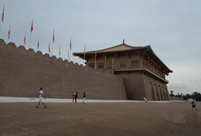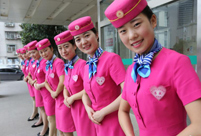 In pics: YOG prism
In pics: YOG prism
 Amputee girl reaches top of half-left tower in Jiangxi
Amputee girl reaches top of half-left tower in Jiangxi
 Yardangs in Lop Nur
Yardangs in Lop Nur
 Intoxicating Ayding Lake in Xinjiang
Intoxicating Ayding Lake in Xinjiang
 Beijing's MJ impersonator a 'thriller' for crowds
Beijing's MJ impersonator a 'thriller' for crowds
 Armed police compete on the plateau
Armed police compete on the plateau
 Rubber Duck settles in Guiyang new urban area
Rubber Duck settles in Guiyang new urban area
 Rare set of giant panda triplets turn one month old
Rare set of giant panda triplets turn one month old
 Closing ceremony of Youth Olympic Games
Closing ceremony of Youth Olympic Games
 Attractive posters to welcome freshmen
Attractive posters to welcome freshmen
BEIJING, Sept. 1 -- As Chinese students file into the classroom for the start of the new school year on Monday, parents are applauding a new set of reforms aimed at promoting educational equality.
For years, the public has criticized primary and middle school enrollment as "unequal and lacking of transparency."
Eager to ensure a bright future for their children, wealthier parents often go to great lengths to get their child into first-class schools. From shelling out tens of thousands of yuan for "school selection fees" to showering school officials with lavish gifts, the competition for enrollment is fierce in China, where education is among a parent's highest priority for their child.
But this year, a set of reforms aims at equalizing the playing field.
With the central government urging reasonable allocation of resources, they are enacting a new set of rules that will help schools meet a higher standard and curb arbitrary "school selection fees."
They're also enacting a new regulation which limits students to schools near home.
Waving goodbye to his son at the gate of Beijing Shijia Primary School on Monday morning, parent Liu Changsong says the reforms are a refreshing change.
Previously, in order to secure a seat for their child at Beijing Shijia Primary School parents had to know someone, have influence or otherwise gain "guanxi" by giving gifts and money.
With recent anti-corruption activities creating a hypersensitivity to activities such as taking money for seats in schools, enrollment has been more open this year. ,
"I never thought of sending my child to an outstanding primary school without paying extra," he says.
Parents, including migrant workers, in Beijing, east China's Shandong and north China's Hebei where reforms are strictly implemented this year, said no money or gifts were needed in signing their children up for top schools, as long as they lived in the school district.
Meanwhile, first-class schools are also assigned to help raise overall education standards by regularly pooling teaching resources and sending instructors to "weaker" schools.
In some cases, the schools simply join first-class schools in order to better allocate resources.
For instance, Shijia Primary School has five branches and more than 500 teachers and 5,000 students. Wang Huan, the school's headmaster, said teaching quality should be unified in all Shijia schools.
However, wealthy families are still finding ways around the system. In some cases they go as far as buying an apartment in the school district where their desired schools are located. Many real estate agents have cashed in on school-district housing, charging high prices for apartments near good schools.
Experts suggest a reasonable and gradual shift in the demarcation of school districts so each district has at least one outstanding school.
 Models with two-dimensional codes painted on bodies
Models with two-dimensional codes painted on bodies Antique exhibition of Maritime Silk Road held in Jinan
Antique exhibition of Maritime Silk Road held in Jinan NASA releases images of solar flare
NASA releases images of solar flare Daming Palace in Chang’an City in photos
Daming Palace in Chang’an City in photos Babies of celebrities born in the year of horse
Babies of celebrities born in the year of horse Farmer Painting, one of Ansai's Three Strange Wonders
Farmer Painting, one of Ansai's Three Strange Wonders Special holidays
Special holidays World's top 10 fighters
World's top 10 fighters 'Stewardesses' serve in hospital
'Stewardesses' serve in hospital The biggest duty-free store of the world
The biggest duty-free store of the world Volunteers bid farewell to YOG
Volunteers bid farewell to YOG More police dogs join anti-terror campaign in Inner Mongolia
More police dogs join anti-terror campaign in Inner Mongolia Picturesque Dayilan Manchu village in NE China
Picturesque Dayilan Manchu village in NE China Athletes experience the charm of Chinese traditional opera in Nanjing
Athletes experience the charm of Chinese traditional opera in Nanjing Contestants for Miss Bikini World experience Chinese traditional culture
Contestants for Miss Bikini World experience Chinese traditional cultureDay|Week|Month